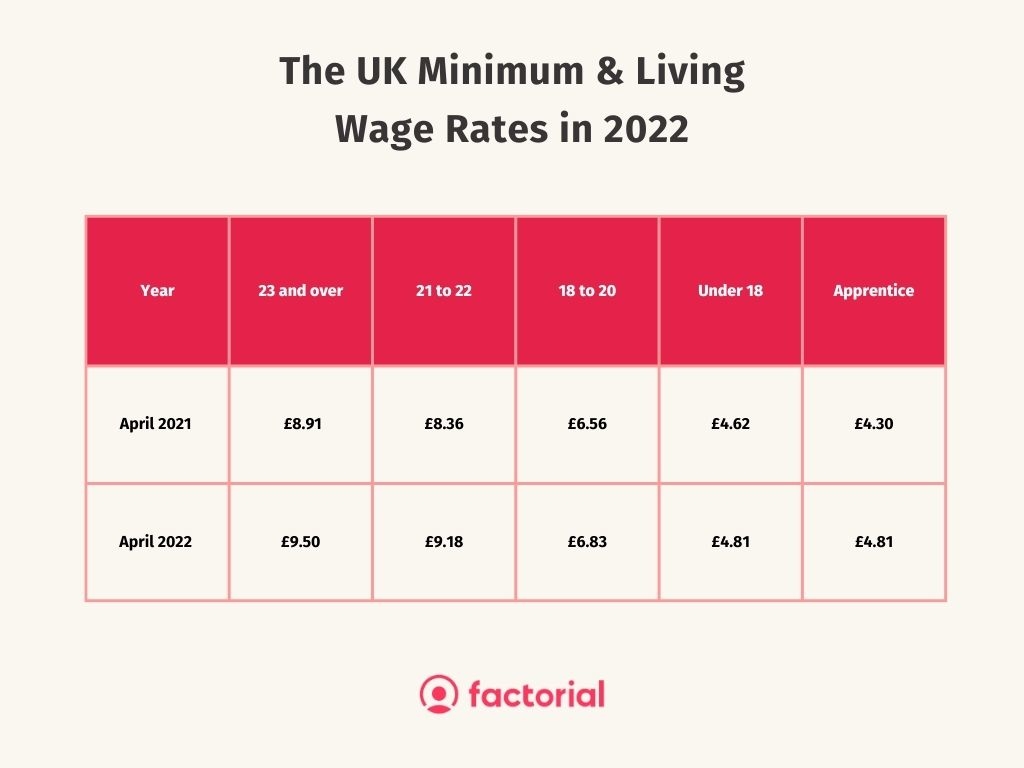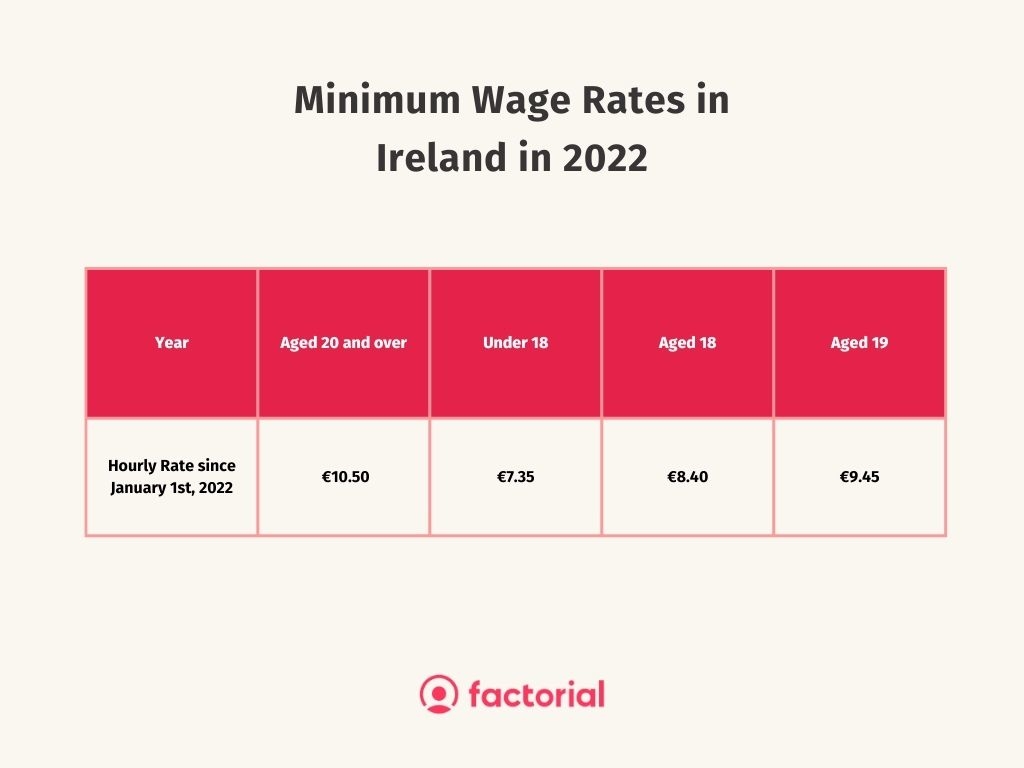Check the National minimum wage for 2023 here
The UK National Minimum Wage is the minimum pay per hour a UK business can legally pay an employee from April 2022. The UK government review and establishes this new wage every year to ensure that workers receive economic compensation that covers basic living costs.
Keep reading to discover how to calculate the New Minimum Wage and explore how this can help you to recruit and retain talent:
- What is The National Living Wage?
- What Is the National Minimum Wage in 2022?
- The UK Minimum & Living Wage Rates in 2022
- Who is entitled to Minimum Wage UK?
- Workers Who Don’t Qualify for the UK Minimum Wage 2022?
- How is the National Minimum Wage Calculated:
- Minimum Wage Rates in Ireland
- What Is the Real Living Wage?
- Benefits of a Higher Minimum Wage
- How Does Minimum Wage Affect Human Resources?
- Corporate Social Responsibility (CSR)
- ✅ Manage Employees’ Payments
What is The National Living Wage?
The National Living Wage was introduced in 2016 and is also reviewed every year by the UK government. This wage scheme is higher than the UK National Minimum Wage, and solely benefits workers aged 23 and over.
What Is the National Minimum Wage in 2022?
Fortunately, the UK minimum wage is increasing from April 2022, bringing the pay of millions of workers up to £9.18 an hour. All in all, it represents an increase of 6.6% compared to the current rates and affects UK workers aged 23 and over. Such updates define a yearly increase of £1,074 per worker.
The UK Minimum & Living Wage Rates in 2022
Here are the UK 2022 NLW and NMW rates below:
| Previous rate | Rate from April 2022 | Increase | |
|---|---|---|---|
| National living wage | £8.91 | £9.50 | 6.6% |
| 21-22-year-old rate | £8.36 | £9.18 | 9.8% |
| 18-20-year-old rate | £6.56 | £6.83 | 4.1% |
| 16-17-year-old rate | £4.62 | £4.81 | 4.1% |
| Apprentice rate | £4.30 | £4.81 | 11.9% |
| Accommodation offset | £8.36 | £8.70 | 4.1% |

Source: National Minimum Wage and National Living Wage rates – GOV.UK (www.gov.uk)
Who is entitled to Minimum Wage UK?
According to the Government, the national living wage applies to all UK workers, even if they are not paid by the hour. On the other hand, apprentices and workers over the age of 23 also qualify for the minimum living wage rates. You can check the minimum wage for different work contracts on the government website. Employees working part-time, casual labourers, trainees, and offshore workers are also eligible.
Workers Who Don’t Qualify for the UK Minimum Wage 2022?
The minimum wage does not apply to workers who are self-employed, unpaid volunteers, company directors and family members who live in the home of the employer and do household chores.
How is the National Minimum Wage Calculated:
To calculate the right rates, you need to know that the government includes time spent:
- at work and required to be working
- not working because of a machine breakdown, but kept at the workplace
- waiting to collect goods, meet someone for work or start a job
- travelling in connection with work
- training or travelling to training
- at work and under certain work-related responsibilities
What’s not included:
- travelling between home and work
- away from work on rest breaks, holidays, sick leave or maternity leave
- on industrial action
- not working but at the workplace or available for work
Minimum Wage Rates in Ireland
Since January 1st, the national minimum hourly rate increased to €10.50 for workers aged 20 and over:
| Aged 20 and over | Under 18 | Aged 18 | Aged 19 | |
| Hourly Rate since January 1st, 2022 | €10.50 | €7.35 | €8.40 | €9.45 |

Source: gov.ie – UK National Minimum Wage will increase 1 January 2022 (www.gov.ie).
What Is the Real Living Wage?
The Real Living Wage is a voluntary scheme, meaning that not all employers need to abide by this law. This scheme aims to pay workers higher than the minimum wage, and the wage is set according to living costs such as rent, fuel, energy and food. This year the Real Living Wage will change to £9.90 in UK and £11.05 in London as living costs increase.
Since the pandemic, over 9,000 UK businesses and employers have implemented the real living wage within their companies. This is fantastic news for employees, and will no doubt encourage jobseekers to choose these employers over others that only offer the UK national living wage. These employers believe their staff need higher pay to cover their needs and pay the cost of living.
Benefits of a Higher Minimum Wage
Boosting the economy of your employees has several benefits. Therefore, a higher minimum wage can improve your employee morale and employee productivity, which will consequently improve your staff turnover rate. On the other hand, paying a higher salary will have a positive impact on your brand reputation, helping you to attract professionals looking for long-term business relationships.
Furthermore, if you consistently pay above-average wages for entry-level jobs and provide additional employee benefits like health insurance or retirement plans for part-time workers, you will be seen as a socially conscious employer, gaining loyalty from customers and employees.

How Does Minimum Wage Affect Human Resources?
When it comes to recruitment, minimum wage rates are crucial to attracting and retaining talent. Indeed, every day more companies are paying the Real Living Wage to compete and attract the best candidates. Therefore, to attract, retain, and build a good team, consider paying more than the minimum wage set by the government.
Investing in your staff will help them grow, and the positive changes in their work can affect the productivity of your business.
Corporate Social Responsibility (CSR)
Corporate social responsibility (CSR) refers to a company’s concern for and commitment to the welfare of its employees, the environment, and their communities. It includes the economic impact, as it assumes the social responsibility for equity pay. This is and will continue to be one of the key HR trends in 2022.
It’s no surprise that sustainable companies are likely to be more attractive to candidates and investors too. That’s how CSR initiatives can impact the process of building and managing your business.
Managing Employees’ Payments
Effectively manage contracts and salaries by ensuring that you’re paying your employees fairly. To comply with minimum wages, you need to track employee hourly rates.
With the Factorial HR software, you can digitalise your entire HR process and manage employees’ contracts with ease. It will help you check if you’re complying with HMRC requirements and offering a salary that covers the cost of living.





